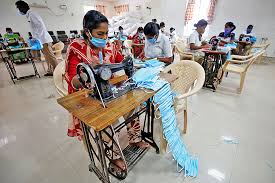Auto-rickshaws, village farmers, and aunties selling aachar may seem like very different types of work. Yet, they all belong to the local and informal economy that thrives across the country. These activities demonstrate how independent workers and small businesses contribute significantly to India’s diverse economic landscape, supporting communities and sustaining vibrant markets.
When we think of Indian economics, big names often come to mind: Tata, HDFC, or even global brands that have gained immense popularity in India, like Nestlé with its instant noodle brand ‘Maggi’. Yet, the informal parts of the economy play an equally significant role in shaping the country’s economic landscape. This underlines the need to explore how small-scale businesses and local markets contribute to India’s growth, particularly in bustling metro cities like Mumbai.
Smaller-scale, informal ventures are a major source of employment in India, providing jobs to millions of people, especially in urban and semi-urban areas. Auto-rickshaw drivers, for instance, offer a crucial mode of transport in many cities while also providing livelihood opportunities for those with limited formal education or training. Similarly, street vendors and local artisans sustain themselves and their families through their work, offering a diverse range of goods and services to the community. Informal enterprises also contribute to the economy’s adaptability and resilience. They often operate with lower overheads and can quickly adjust to changing market conditions and consumer demands. For example, during the COVID-19 pandemic, many small-scale ventures, such as local grocery stores and home-based food vendors, pivoted to offer delivery services and adopted digital payment methods. This flexibility allows them to continue serving their communities while navigating economic disruptions.
Here in Mumbai, smaller-scale, informal ventures are deeply intertwined with the city’s identity. Our bustling metropolis is known for its street food scene, which is dominated by small vendors offering affordable, quick meals to residents and tourists alike. Our city’s iconic “dabbawala” system showcases the efficiency and reliability of informal networks, with a network of workers delivering home-cooked meals across the city every day. Not only do these enterprises contribute to Mumbai’s vibrant culture, but also play a crucial role in its local economy.
As India continues to evolve, the pulse of its economy beats strongest in the hands of its smaller-scale, informal businesses. While India grows and modernizes, these local entrepreneurs and workers remain central to the country’s economic resilience and adaptability. By fostering communities, creating jobs, and sustaining dynamic markets, they hold a key role in shaping India’s future. Understanding and nurturing these smaller economic actors is crucial for India to thrive on both local and global stages.
-Mriganka M T, AS C






Leave a comment